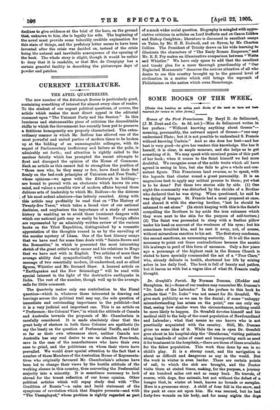SOME BOOKS OF THE WEEK.
[Under this heading we notice such Rooks of the weele as ham net bees reserved for review in other forms.] Homes of the First Franciscans. By Beryl D. de Selincourt, (J. M. Dent and Co. 4s. 6d. net.)—Miss de Selincourt writes in her preface : "Without knowing anything about Greece"— meaning, presumably, the outward aspect of Greece—" one may understand Plato ; but it is not possible to understand S. Francis without knowing Umbria." And so she does her best—and her best is very good—to give her readers this knowledge. She has it herself, it is clear, in ample measure, and she helps us to get something of it. We may speak with unmixed praise of this part of her book ; when it comes to the Saint himself we feel more doubtful. We recognise some of the noble traits which all have agreed in seeing in him, but she fails to give a whole and con- sistent figure. This Franciscan land swarms, so to speak, with the legends that cluster round a great personality. It is an ungracious task to apply any critical process to them ; yet what is to be done? Put these two stories side by side. (1) One night the community was disturbed by the shrieks of a Brother who declared that he was dying. When questioned, he said he was dying of hunger. St. Francis had a meal prepared at once, and shared it with the starving brother, "lest he should be ashamed to eat alone." (In strict keeping with this is the Saint's compelling the Brothers to lay aside the iron cuirasses which they wore next to the skin for the purpose of self-torture.) (2) The Saint was persuaded to sleep with a feather pillow under his head on account of the weakness of his eyes ; but his conscience troubled him, and he cast it away, not, of course, without miraculous sanction to his act. The first story condemns, the second sanctions, an unmeaning austerity. It is all the more necessary to point out these contradictions because the ascetic life is always in peril of this form of unreason. Only a few years ago a personage of the highest rank in the Roman Church is stated to have specially commended the act of a "Poor Clare," who, already delicate in health, shortened her life by mixing ashes in her daily food. The book is full of beauty and pathos, but it leaves us with but a vague idea of what St. Francis really thought.


































 Previous page
Previous page